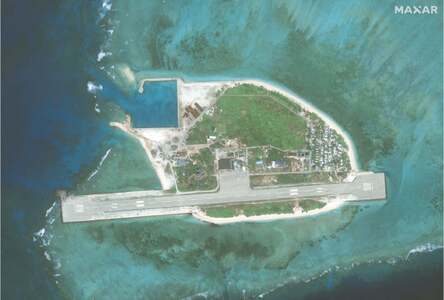BELGRADE: The trial of Radovan Karadzic will be part preacher’s sermon, part revisionist forum and part press event, as his supporters prepare a marathon defence they say will change the world’s view of the Yugoslav wars.
The wartime leader of the Bosnian Serbs, indicted twice for orchestrating genocide in the 1992-95 Bosnia war, was arrested in Serbia on Monday after 11 years on the run. He is now in a Belgrade prison awaiting extradition, which is likely to happen early next week.
Relatives and supporters who have spoken to him say he is in great form, ready to take on the United Nations war crimes court in The Hague, clear his name and restore the honour of Serbs.
“Radovan is spreading great optimism, he’s laughing even when I started crying,” said his brother Luka. “He will conduct his defence on his own. We’ve already prepared the defence strategy and have a lot of prepared papers and evidence.”
In prison, Karadzic shaved off the beard and cut the long hair that was part of his assumed identity as a New Age healer.
Witnesses say he looks like his old self, the man who led Bosnian Serbs in their bid to link Serb areas of Bosnia to Serbia, in cooperation with Serb autocrat Slobodan Milosevic.
“He’s morally and mentally very strong,” said his lawyer in Serbia, Svetozar Vujacic. “He told me he was a great optimist that truth and justice will win, and that he trusts in God.”
The Hague indictment against him currently in force dates from April 2000 and was prepared by former prosecutor Carla del Ponte, who had set the arrest of Karadzic and his military commander Ratko Mladic as her life’s goal.
The 14-page document is a chilling account of killings, rape, torture and expulsions aimed at driving out Bosnian Muslims and Croats from areas claimed by Serbs.
The two most grave charges are over the 1995 massacre of some 8,000 Bosnian Muslim males in Srebrenica, and the 43-month siege of Sarajevo, when more than 11,000 people died from mortar and sniper fire, malnutrition and starvation.
Many people in Serbia and the Serb half of Bosnia say this is a biased account of the war, imposed by Western, anti-Serbian propaganda, and accuse the tribunal of ignoring crimes against Serbs by their wartime enemies.
CONSPIRACY: Karadzic has maintained his innocence since he saw the first indictment in 1995.
“He has studied the indictment and is aware of its content,” said Kosta Cavoski, a Belgrade University law professor and president of a team that has been preparing Karadzic’s defence for years. “He will conduct his own defence.”
The group, the “International Committee for the Truth about Radovan Karadzic”, has prepared a defence file running to thousands of pages, partly based on a series of books containing Karadzic’s wartime letters, interviews, and speeches.
The tribunal may not allow Karadzic to conduct his own defence as experience has shown that without a lawyer defendants can drag out proceedings by appealing for more time to prepare.
With or without counsel, the former psychologist should live up to his reputation as an attention-seeking extrovert who enjoys conspiracy theories and tales of romantic heroism.
He has enough of both to last for the years the trial will need to plough through the paper mountain of evidence: from his secret immunity deal with US envoy Richard Holbrooke which Holbrooke denies to details of unknown crimes against Serbs.
Media interest in the Balkans is huge, and several television stations are preparing to cover his trial live.
“He is a symbol of the war the wars in Bosnia or Croatia weren’t separate, it was really all one war,” said Josip Saric of Croatian state television HRT.
Commentators say the trial, combined with the attitude of a new pro-western government in Serbia, could mark a turning point in the region’s quest for reconciliation.
“Serbs live in denial, they claim they were victims,” Croat writer Slavenka Drakulic noted in an editorial this week.
“What people in Belgrade, Zagreb and Sarajevo... need most is truth. We know that without truth there is no justice, but in the case of these wars, without justice there is no truth.”—Reuters














































Dear visitor, the comments section is undergoing an overhaul and will return soon.